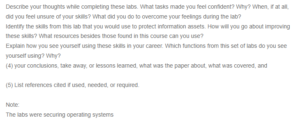Lab Report – Reflection on Securing Operating Systems
Introduction
This lab report reflects my experience completing the safeguarding operating systems labs this week. The document will describe my thoughts while working on the labs, tasks that made me feel confident, times of uncertainty, how I overcame those feelings, skills gained to secure information assets, plans for skill enhancement, and the importance of these abilities in my profession.
Thoughts and Confidence
Throughout the labs, I felt a mixture of exhilaration and dread. Operating system security is critical in today’s digital landscape, and I was keen to learn practical solutions. I was initially confident in detecting potential security flaws, imposing access limits, and deploying firewalls (Meneghello et al., 2019). These activities corresponded to my past knowledge and expertise in IT management, allowing me to apply my skills effectively.
Moments of Uncertainty
However, as I progressed through the laboratories, I had periods of confusion. Some duties necessitated a thorough understanding of encryption methods, network security protocols, and intrusion detection systems. These were unfamiliar areas, and I was concerned about my capacity to accomplish the tasks efficiently. The lab tasks’ intricacy tested my previous skills and identified opportunities for improvement.
Overcoming Challenges
To overcome my uncertainties, I took a proactive approach. To improve my comprehension, I looked for extra resources both within and outside the course materials. I used internet tutorials, documentation, and community forums to learn more advanced ideas. Furthermore, I engaged in discussions with fellow students and the instructor to answer doubts and exchange perspectives. I completed the labs by utilizing these resources and seeking advice.
Skills for Protecting Information Assets
The laboratories taught vital skills for safeguarding information assets. Access control technologies such as user authentication, authorization, and role-based access control were introduced to me. I also learned about network security measures such as firewalls, virtual private networks (VPNs), and intrusion detection systems (IDS) (Grammatikis et al., 2019). These abilities are critical for protecting sensitive data, preventing illegal access, and managing potential dangers.
Improving Skills
To further improve these skills, I intend to engage in hands-on practice and real-world experiences. Setting up virtual surroundings and conducting practical experiments will consolidate my understanding. Furthermore, I will investigate industry-standard certifications and training programs focusing on information security, such as Certified Information Systems Security Professional (CISSP) and Certified Ethical Hacker (CEH). These materials will provide extensive knowledge and practical skills in addition to what is discussed in this course.
Relevance in Career
The skills I learned in these laboratories will be instrumental in my future work as an IT manager. As an IT professional, I use these abilities to develop and build secure systems, manage access restrictions, and conduct risk assessments (Rachit et al., 2021). With the threat landscape becoming more complex, organizations want people who can successfully defend their information assets. My ability to safeguard operating systems and establish strong security measures will make me a significant asset in the industry.
Conclusion
In conclusion, finishing the labs on protecting operating systems was a challenging but gratifying experience. Throughout the process, I experienced moments of confidence and uncertainty. Access control techniques, network security, and vulnerability assessment capabilities are extremely helpful for protecting information assets. I will practice these abilities and look for other tools to help me improve them. Ultimately, I plan to use these talents in my profession to design and execute secure systems and contribute to the security of information assets.
References
Grammatikis, P. I. R., Sarigiannidis, P. G., & Moscholios, I. D. (2019). Securing the Internet of Things: Challenges, threats and solutions. Internet of Things, 5, 41-70. https://doi.org/10.1016/j.iot.2018.11.003
Meneghello, F., Calore, M., Zucchetto, D., Polese, M., & Zanella, A. (2019). IoT: Internet of threats? A survey of practical security vulnerabilities in real IoT devices. IEEE Internet of Things Journal, 6(5), 8182-8201. https://doi.org/10.1109/JIOT.2019.2935189
Rachit, Bhatt, S., & Ragiri, P. R. (2021). Security trends in Internet of Things: A survey. SN Applied Sciences, 3, 1-14. https://doi.org/10.1007/s42452-021-04156-9
ORDER A PLAGIARISM-FREE PAPER HERE
We’ll write everything from scratch
Question

Lab Report – Reflection on Securing Operating Systems
Describe your thoughts while completing these labs. What tasks made you feel confident? Why? When, if at all, did you feel unsure of your skills? What did you do to overcome your feelings during the lab?
Identify the skills from this lab that you would use to protect information assets. How will you go about improving these skills? What resources besides those found in this course can you use?
Explain how you see yourself using these skills in your career. Which functions from this set of labs do you see yourself using? Why?
(4) your conclusions, take away, or lessons learned, what was the paper about, what was covered, and
(5) List references cited if used, needed, or required.
Note:
The labs were securing operating systems


